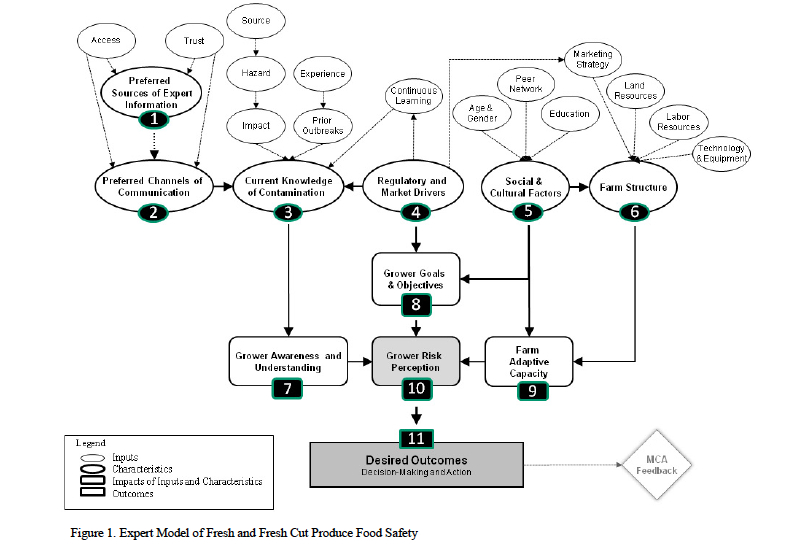If people who write in ALL CAPS are compensating by yelling, people who stress points by writing in italics or excessive use of quotations are compensating for boredom. To paraphrase Strunk and White, let the reader decide what is truly exclamatory and what needs to be emphasized; words, not formatting, can do this.
When people are talking, it’s called air quotes; Jon Stewart famously called them dick fingers in  2008 (video here if you’re in Canada or the U.S.). I call it bad writing.
2008 (video here if you’re in Canada or the U.S.). I call it bad writing.
I also have issues with people who write, “Clearly …” and “we …”
Clear to whom? Who’s we?
Strunk and White agree.
If the reader can get past the writing, a new paper in Food Control supposedly presents a new model for how fresh produce growers make decisions about food safety. I reduce the paper to: don’t care how it’s done, don’t make people barf if you provide food, and talk with growers since they’re growing the food.
I can’t figure out how the “new model” (below) is going to make fewer people barf; guess I’m not into models.
And it’s Powell, not Powel.
Abstract below:
An expert guide to understanding grower decisions related to fresh fruit and vegetable contamination prevention and control
30.dec.11
Food Control
Jason Parker, Robyn S. Wilson, Jeffrey LeJeune, Louie Rivers III, Douglas Doohan
http://www.sciencedirect.com/science/article/pii/S0956713511005664
Abstract
This research intends to refocus the on-farm fresh produce food safety paradigm away from an emphasis on knowledge deficit models and ready-made or tightly-coupled, reductionist solutions toward a loosely-coupled systems approach. The dynamic environment of produce farming and multi-dimensional objectives of produce growers create manifold pathways to address farm specific food safety concerns. We propose a systems approach to facilitate increased decision making of growers using farm-specific criteria to improve their efforts. Currently, social and psychological dimensions of fresh produce food safety are overlooked in program development with preference given to bio-physical knowledge and technological solutions. In this paper, we describe a comprehensive model that was developed through a formal expert elicitation and literature review for the purpose of enhancing education and policy development and improving the microbiological safety of fresh and fresh cut produce. This model illuminates the intrinsic interrelationships among  farm scale, marketing practices, and the need for appropriate food safety interventions. We further discuss how this loosely-coupled systems perspective can both aid our understanding of grower-decision-making and provide a basis for developing equitable solutions to on-farm food safety issues as part of a social-psychological approach to addressing these issues.
farm scale, marketing practices, and the need for appropriate food safety interventions. We further discuss how this loosely-coupled systems perspective can both aid our understanding of grower-decision-making and provide a basis for developing equitable solutions to on-farm food safety issues as part of a social-psychological approach to addressing these issues.
Highlights
? US farm scale diversity should be part of food safety policy recommendations. ? Experts need to be aware of their biases of produce grower decision-making. ? A grower-centered approach will enhance new policy, standards, and metrics. ? Farmer input is needed to adapt practices to farms of all scales. ? Avoid one-size-fits-all practices developed for large-scale produce production.
 “The 1,200-odd people were pulled out from their duties,” an official of the Pyeongchang Olympic Organizing Committee was quoted as saying by AFP. “They were replaced by some 900 military soldiers. Health authorities were investigating the origin of the virus,” he said.
“The 1,200-odd people were pulled out from their duties,” an official of the Pyeongchang Olympic Organizing Committee was quoted as saying by AFP. “They were replaced by some 900 military soldiers. Health authorities were investigating the origin of the virus,” he said.
 2008 (
2008 ( farm scale, marketing practices, and the need for appropriate food safety interventions. We further discuss how this loosely-coupled systems perspective can both aid our understanding of grower-decision-making and provide a basis for developing equitable solutions to on-farm food safety issues as part of a social-psychological approach to addressing these issues.
farm scale, marketing practices, and the need for appropriate food safety interventions. We further discuss how this loosely-coupled systems perspective can both aid our understanding of grower-decision-making and provide a basis for developing equitable solutions to on-farm food safety issues as part of a social-psychological approach to addressing these issues. Kentucky’s Louisville Courier-Journal reports that another well-known White Castle in Louisville is slated for the wrecking ball, but this one will be rebuilt as the largest in the chain.
Kentucky’s Louisville Courier-Journal reports that another well-known White Castle in Louisville is slated for the wrecking ball, but this one will be rebuilt as the largest in the chain.